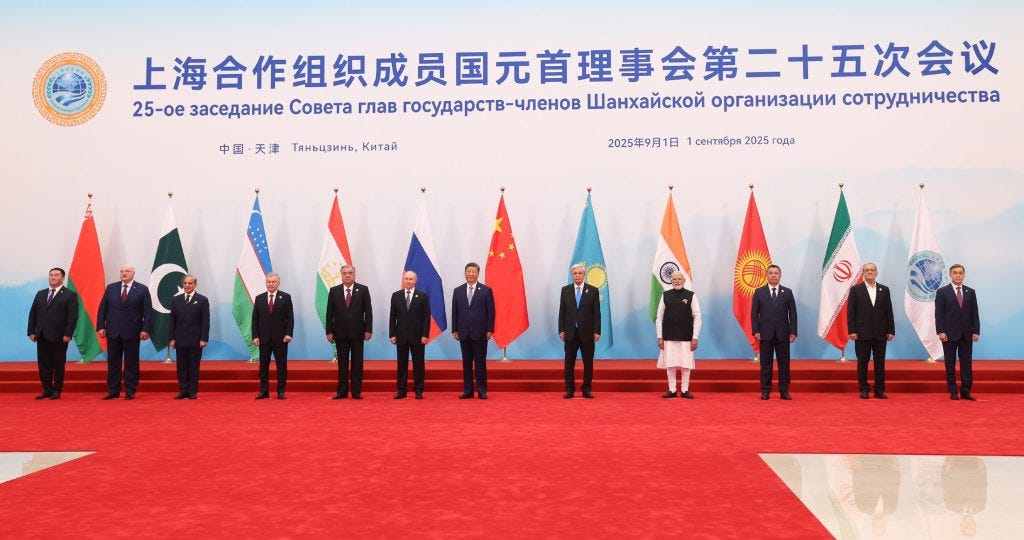SCO’s power play: Can China rewrite the rules of global governance?
By Srikanth Kondapalli, Jawaharlal Nehru University, New Delhi
Today’s Article is brought to you by Empower your podcasting vision with a suite of creative solutions at your fingertips.
This piece is freely available to read. Become a paid subscriber today and help keep Mencari News financially afloat so that we can continue to pay our writers for their insight and expertise.

By gathering 24 leaders from different parts of Asia and Russia, the Shanghai Cooperation Organisation (SCO) has sent concerted signals for changes in global and regional power structures.
The meeting announced plans for strengthening energy security and economic cooperation under a new Development Bank.
The 25th rendition of the SCO summit meeting at Tianjin in China on August 31 to September 1 was followed by a spectacular military display at Beijing on September 4.
These two major events also signal a resolve to not only consolidate and contest the vagaries of the USA’s Trump administration, which had imposed debilitating tariffs on almost all countries, but also tweak the global and regional orders.
The Tianjin declaration noted “profound historical changes” and said “geopolitical confrontations are intensifying, posing threats and challenges to the security and stability of the world and the SCO region. The global economy, particularly international trade and financial markets, is suffering severe shocks.”
This is in political line with the host country China’s leader Xi Jinping’s repeated slogans of “great changes unseen in a century” (百年未有之大变局).
The assumption here is that the US is a declining power and that China and its “partners” (such as those 11 countries who subscribed to China’s “community of shared destiny”) will be able to prevail in the global and regional orders. India has not endorsed the “community of shared destiny”.
Truth matters. Quality journalism costs.
Your subscription to Mencari directly funds the investigative reporting our democracy needs. For less than a coffee per week, you enable our journalists to uncover stories that powerful interests would rather keep hidden. There is no corporate influence involved. No compromises. Just honest journalism when we need it most.
Not ready to be paid subscribe, but appreciate the newsletter ? Grab us a beer or snag the exclusive ad spot at the top of next week's newsletter.
China did make substantial progress as reflected in its “dual circulation economy” of imports and exports and domestic consumption, becoming “superpower” in eleven areas such as digitalisation, trade, hi-tech manufacturing, ship building, 5G telecom, drones, automation, robotics and others.
It is also gradually disassociating with the US or becoming autonomous in trade, semiconductors, energy and others while increasing costs for the US on magnets and rare earth metals.
The Beijing military parade also showcased nearly 50 new military technologies, power projecting forces and offensive “new domain and new quality military operational capabilities”. Although China’s military equipment supplied to Pakistan performed miserably in the recent India-Pakistan conflict on May 7-10, nevertheless, this is bound to trigger a fresh arms race in the region.
However, Beijing needs allies and friends in the regional and global arenas. It needs to re-invent its magical weapon of “united front” – as displayed at the Tianjin and Beijing confabulations. It also needs geographical space to hone its skills.
The Tianjin Declaration identified Central Asia as the “core area of the SCO” in order to build an “indivisible security architecture in Eurasia.”
China has been building extensive ties with the region through its summit meetings with Central Asian republics, energy pipelines, railways and integration with Eurasian Economic Union.
Previously, ASEAN was declared as the “core” and in the “drivers’ seat”. Today, more than half of the ASEAN countries have joined China’s bandwagon, without resolving the South China Sea islands disputes amicably.
While other major powers like Russia and India are regional and inward- looking, China has announced a medium-term development strategy for 2026 to 2035.
Banking on its Belt and Road Initiative (BRI), in which China spent more than a trillion dollars, the Tianjin Declaration suggested building an “open, transparent, fair, inclusive, and non-discriminatory multilateral trading system”, trade facilitation within the SCO framework, reforming international financial institutions to increase the representation and voice of developing countries and settling trade in local currencies.
These are significant moves to diversify and consolidate trade from western markets to Eurasia, undercut the influence of the US dollar and enhance China’s currency renminbi as a global currency from the current three percent.
However, intra-SCO trade is not high and trade barriers remain. Many countries also complain of lack of market economy status, or even discrimination, in China. These undermine China’s statements and ambitions.
One area in which the SCO wants to bridge the gap with the West is the energy sector. The declaration mentioned a road map for 2030 in “promoting the sustainable, stable, and balanced development of a non-discriminatory global energy market.” The SCO combines major energy producers like Russia, Kazakhstan, Iran and others and importers like China and India.
Nevertheless, while Russia wanted to bank on the energy demand in China through its Power of Siberia 2 pipeline to China via Mongolia by transferring an estimated 50 billion cubic meters a year, Beijing has not cleared the decks, nor provided transit routes to India or other countries. Overall, to make a dent into the global energy cartels, China and other countries have to pump in finance and technology.
The SCO made a mark in the security field since the 1990s when they resolved border disputes and ushered in confidence building measures and counter-terrorism efforts. It had declared a new anti-drug centre, strategic security research centre and endorsed “SCO+” security dialogue. This is significant as Quad+ has not gathered momentum yet.
The SCO also raised its voice against weaponisation of outer space. However, these measures at best remain defensive in nature and a larger security architecture build-up is missing in the region that is acceptable to all and to buttress the emerging security order.
Thus, despite many statements at the SCO meeting at Tianjin and the military parade at Beijing, and the concerted efforts of all participants, the fact of the matter is that global structural power changes incrementally and gradually. Successive American administrations have depleted their soft power abroad, spent over US $14 trillion in wars, and now the Trump Administration is seemingly destroying its alliances and legitimacy.
However, the next-largest economy China is careful in avoiding Nazi German or Japanese examples of the 1930s and intends to bring about a global power transition indirectly and deceptively.
Srikanth Kondapalli is Professor in Chinese Studies at Jawaharlal Nehru University, New Delhi
Originally published under Creative Commons by 360info™.
Sustaining Mencari Requires Your Support
Independent journalism costs money. Help us continue delivering in-depth investigations and unfiltered commentary on the world's real stories. Your financial contribution enables thorough investigative work and thoughtful analysis, all supported by a dedicated community committed to accuracy and transparency.
Subscribe today to unlock our full archive of investigative reporting and fearless analysis. Subscribing to independent media outlets represents more than just information consumption—it embodies a commitment to factual reporting.
As well as knowing you’re keeping Mencari (Australia) alive, you’ll also get:
Get breaking news AS IT HAPPENS - Gain instant access to our real-time coverage and analysis when major stories break, keeping you ahead of the curve
Unlock our COMPLETE content library - Enjoy unlimited access to every newsletter, podcast episode, and exclusive archive—all seamlessly available in your favorite podcast apps.
Join the conversation that matters - Be part of our vibrant community with full commenting privileges on all content, directly supporting The Evening Post (Australia)
Catch up on some of Mencari’s recent stories:
It only takes a minute to help us investigate fearlessly and expose lies and wrongdoing to hold power accountable. Thanks!






